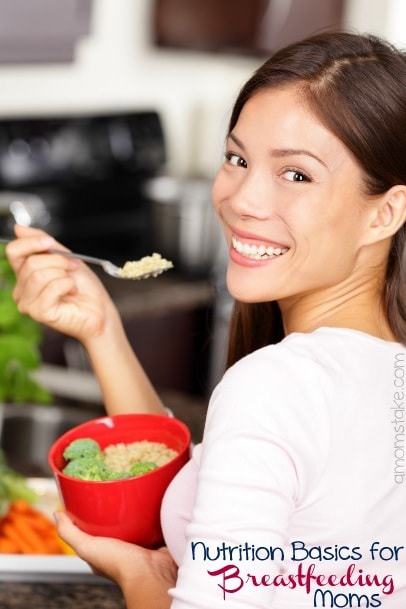This post is sponsored by Similac.
We know that new moms have a lot a lot on their plates, but a new study shows they need to pay more attention to what’s on their plates. The diet of many nursing women may not contain enough of certain key nutrients for their baby.

A study of lactating women found that, “subjects consumed 50% or less of fruit, vegetable, and dairy intake as recommended by MyPlate.” Many diets are missing key nutrients such as:
- DHA: (docosahexaenoic acid) a fatty acid essential for a baby’s brain development
- Lutein: a component in breast milk that supports eye health
- Vitamin E: an important antioxidant to support developing cells
I had the opportunity to interview Abbott Research Scientist Christina Sherry who led the study about nutrition basics for breastfeeding moms. You can read the interview here or watch the short 3 minute clip.
At Abbott Nutrition we recently just conducted a study looking at the dietary intakes of lactating women. Surprisingly, many women don’t realize that their nutritional needs are the greatest during breastfeeding than any other time in their life, even when they were pregnant. And there’s very little information about what is mom eating, so that’s exactly what we looked at in our study. When we analyzed the diets of lactating women we found that over 50% of the women in our study were not meeting the recommendations for some very key food groups such as fruits, vegetables and dairy. We know that these food groups contain lots of vitamins, minerals, and key nutrients that are very important for mom and baby. Specifically, nutrients such as DHA, leutin and Vitamin E that are important for babies brain and eye development – many moms were not consuming the ideal levels.
Q: How can moms make sure they get enough DHA, Lutein or Vitamin E in their diets, are there certain foods that are best for consuming for that?
So, as a dietitian, yes we want to focus on food first for mom. We want to make sure she understands some of the key foods that provide these important nutrients such as leafy greens are a great source of luetin, salmon or other fatty fish are a great source for DHA, and nuts is a wonderful source for Vitamin E. From our study we know mom’s very busy, though, and many women were just probably not finding the time or for other reasons to be able to eat these foods on a regular basis. So there’s a Similac breastfeeding supplement that was specifically designed to have the ideal levels of these three key nutrients to provide mom with the peace of mind that she’s giving her baby her best.
Q: Can you tell me more about the Similac Breastfeeding Supplement: How many do they take a day, is it something they can buy over the counter?
The Similac Breastfeeding supplement is designed to be taken with your regular multivitamin or if mom’s continuing her prenatal vitamin – we really focus on those three key nutrients, so if mom’s taking any other vitamins it’s great that she takes those at the same time. It’s available at Babies ‘R’ Us, it’s a supplement that she takes once a day.
Q: Where can I get more information?
Similac.com has all the information that mom will need about this topic: more information about what are her dietary needs when she’s lactating, more information about the supplement as well as the study.
 About Christina Sherry, Abbott Research Scientist
About Christina Sherry, Abbott Research Scientist
Christina Sherry is a research scientist at Abbott. She is an expert in prenatal and pregnancy nutrition with a focus on nutritional early programming of later health outcomes. Prior to joining Abbott, Christina was a post-doctoral fellow at the University of Michigan. She earned a bachelor’s degree in dietetics from Bluffton University and her Ph.D. in nutritional science from The University of Illinois at Urbana-Champaign.

Ann Bacciaglia
Thursday 28th of August 2014
I breastfed both of my kids for a year. I remember being very hungry all the time. I don't think that I ate nearly enough. Great tips!
valmg @ Mom Knows It All
Thursday 28th of August 2014
I didn't breastfeed. It's great that Similac recognized a need for breastfeeding mothers and offers a product for it.
brett
Thursday 28th of August 2014
eating for myself was a hard one when i was nursing at least when they were teeny tiny. it was just the last priority for me.
Kelsey Apley
Thursday 28th of August 2014
My sister is due in November, so I will share this with her. She is planning to breastfeed as long as she can.
Nicole B
Thursday 28th of August 2014
That's great info for breastfeeding moms. I would have taken a supplement to help me. New moms can be overwhelmed with things. I know that eating dropped down on my priority list anytime I had a newborn. I would rather have sleep! :)